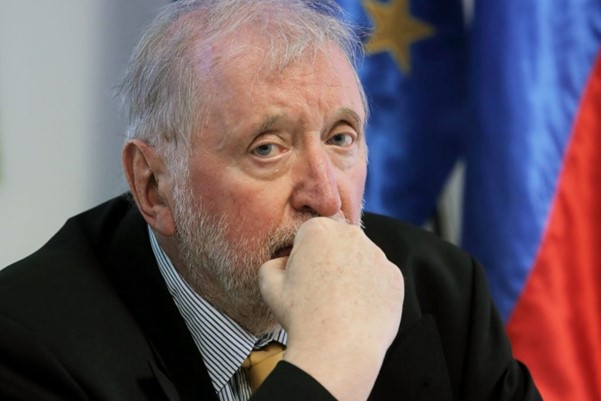Every now and then, the Slovenian mainstream media, operating under the aegis of the transition left, comes up with ill-considered “peace-making” interventions advocating an end to aid to the invaded Ukraine. Their formula is fairly simple – peace will be achieved when the invader prevails in the invaded country. But now, the former Foreign Minister and Professor Dr Dimitrij Rupel responded to the latest letter of this kind, entitled “Against warmongering and war financing,” and he was very critical of what was written.
“Even a superficial reader will quickly notice that our hundred and more opponents of ‘warmongering and financing of a new war’ are opposed to NATO and European Union decisions on military aid to Ukraine, to the increase of arms and ammunition production in the EU, and to the ‘creation of a war economy’, in fact to the entry into war. The war in Ukraine should also come in handy for the Slovenian government or its President Dr Robert Golob,” Dr Rupel wrote in his introduction.
Rupel then polemicised with the author of the text, Dr Igor Ž. Žagar, whom he considers to be ineptly arguing for a kind of proxy war by the West (the US and the EU) against an undefeated Cold War adversary – the Russian Federation.
“This position of the Ž text (written by Dr Igor Ž. Žagar) is strange, because it associates the Russian Federation with the Cold War, for which we know it only earned its position as an international actor after and because of the end of the Cold War, and therefore could not have been its ‘enemy’, whereas the defeated side in the Cold War was, in fact, the Soviet Union (1989-1991),” wrote Dr Rupel.
Rupel believes that the author of the so-called peace letter simplified international relations and the international situation by presenting it as a great clash between the West and the rising power of the “East”.
Phrases from the dark chapters of the past
Rupel went on to say that the author of the “peace” text (according to what was written) did not intend to give a rigorous geopolitical analysis, but to polemicise with the current Slovenian authorities.
In Rupel’s note, there is a particularly interesting observation related to the terminology used by the newly-appointed “peacemakers” or supporters of “Russian peace”. In many ways, it resembles terminology that we know all too well from the darkest chapters of our history.
As Dr Rupel wrote: “A more sophisticated – let us say desperate – reader will recognise in the Ž text the formulas and political phrases that characterised the so-called peace and Soviet-inspired (and paid for?) movements before the Second World War and, of course, many times afterwards. Document Ž contains similar formulations to those contained in the conciliatory statements towards Hitler made by Western (Chamberlain) and Eastern (Stalin) governments in 1938 and 1939.”
Known “peacemakers” who would withhold aid from Ukraine
The last “peacemaker” letter was signed by fellow travellers and/or actors of the transitional left, who are already well-known to our readers. Many of them will be easily recognisable to them:
Professor Dr Igor Ž. Žagar, Professor Dr Rastko Močnik, Professor Dr Marko Uršič, Associate Professor Dr Katja Košir, Dr Andrej Lukšič, Dr Miklavž Komelj, Darja Matjašec, Dr Boris Vezjak, Franjo Žagar, Dr Marjan Šimenc, Dr Gorazd Kovačič, Professor Dr Gregor Pompe, Aurelio Juri, Ira Zorko, Ljuba Miljušević, Maja Breznik, Barbara Mali, Associate Professor Dr Tea Sernelj, Tomaž Wraber, Mojca Dobnikar, Janoš Ježovnik, Professor Dr Jana Rošker, Vlado Odar, Professor Emeritus Dr Andrej Mašera, Professor Dr Darko Štrajn, Dr Iztok Osojnik, Miha Zadnikar, Dr Zdenko Kodelja, Tomaž Sajevic, Dr Primož Šterbenc, Professor Dr Rudi Rizman, Dr Tomaž Mastnak, Igor Polajnar, Polona Jamnik, Remzo Skenderović, Bojan Končan, Janez Černač, MSc, Janez Martinjak, Franco Juri, Professor Dr Bogomir Kovač, Marko Apih, Dr Uroš Lipušček, Professor Dr Ana Kučan, Professor Dr Bojan Baskar, Esmeralda Vidmar, Amila Adrović, Bojana Leskovar, Irena Weber, Viktorija Potočnik, Dr Polona Petek, Dr Darij Zadnikar, Dr Božidar Flajšman, Karel Geržan, Jelka Kernev Štrajn, MSc, Ancila Florijančič, David Kac, Beba Stiasny, Professor Dr Lev Kreft, Ana Kralj, Mirsad Begić, Igor Mekina, Svetlana Vasović Mekina, Dr Andreja Hočevar, Slavko Godec, Jože Muhič, Dr Borut Koloini, Miha Hočevar, Professor Emeritus Dr Danijel Rebolj, Dr Igor Koršič, Izidor Barši, Anton Kalan, Jana Habjan, Saša Burian, Slavka Artnik, Branka Lemajić, Luka Bernot, Igor Škrjanc, Ivo Poderžaj, Dr Peter Tancig, Dr Simona Tancig, Dr Amelia Kraigher, Violeta Tomić, Uroš Stroj, Vlado Kljajič, Robin Dewa, Jana Unuk, Marko Goršič, Jan Supovec, Marko Mrak, Davorin Petaros, Maja Megla, Marjan Hribernik, Andrej Novoselnik, Rok Dobravec, Sandi Novinec, Alenka Pečnik, Andrej Knaus, Jolanda Petek Tomazin, Igor Orel, Dr Maja Lavrač, Bojan Trebičnik, Darka Bajec, Metka Bertoncelj, Matjaž Hanžek, Vesna Kalabić, Slavko Mezek, Alois Kolar, Božidar Cimerman, Joško Štenkler, Miha Kozorog, Aleš Učakar, Dr Andraž Jež, Dr Metka Mencin Čeplak.
Ž. K.


